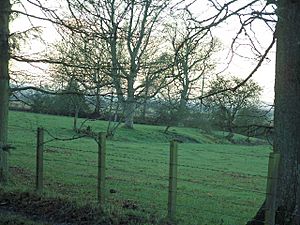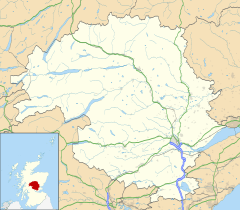Carpow facts for kids
Quick facts for kids Carpow |
|
|---|---|
 Roman fort at Carpow |
|
| OS grid reference | NO203175 |
| Council area | |
| Lieutenancy area | |
| Country | Scotland |
| Sovereign state | United Kingdom |
| Post town | PERTH |
| Postcode district | PH2 9xx |
| Dialling code | 01738 85 |
| Police | Tayside |
| Fire | Tayside |
| Ambulance | Scottish |
| EU Parliament | Scotland |
Carpow is a small village in Perth and Kinross, Scotland. It sits right where the River Tay and River Earn meet. You can find it about 2 kilometers northeast of Abernethy. Carpow is famous for its amazing ancient discoveries. These include old Roman forts and tools from people who lived there thousands of years ago.
Contents
What's in a Name?
The name Carpow comes from the ancient Pictish language. The first part, *cair, means "fort" or "castle". The second part, *pol, means a "slow-moving stream" or "burn". So, Carpow basically means "fort by the stream".
Discovering Carpow's Past
Carpow is a very important place for archaeology. This is the study of human history through digging up old things. People have lived in the Carpow area for a very long time.
Stone Age Discoveries
About 8,000 years ago, Mesolithic people lived here. They were hunter-gatherers, meaning they found their food by hunting animals and gathering plants. Later, around 4,000 BC, farming began in the area. People from the Neolithic period built large standing stones and stone circles nearby.
Bronze Age Finds
An amazing discovery was made in the River Tay at Carpow. It was a Bronze Age log boat. This boat was made from a single tree trunk. It is about 3,000 years old and was found in the river's mudflats.
Roman and Early Medieval Times
During the time of Roman rule, Carpow was home to a large Roman camp and fort. This fort was built with strong stone. This showed that the Romans planned to stay for a long time. Later, a piece of an early medieval cross was found here. It was made by the Picts, an ancient Scottish people.
The Roman Fort at Carpow
The Roman fort at Carpow was a very important military base. It was built where the River Tay and River Earn join together. This location was perfect for controlling the rivers. The Romans used this fort from the late 100s AD to the early 200s AD.
Historians believe the fort was a major supply base for the Roman army. It helped provide food and equipment for Roman soldiers in the Central Lowlands of Scotland. The fort was also used during the military campaigns of Septimius Severus. He was a Roman emperor who led his armies in Scotland.
 | Janet Taylor Pickett |
 | Synthia Saint James |
 | Howardena Pindell |
 | Faith Ringgold |


